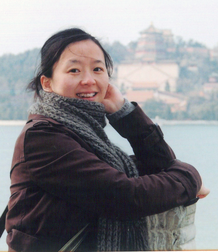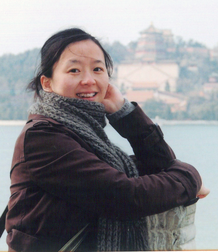Award and career jump for young female scientist from Mainz
Yafang Cheng receives Minerva position at Max Planck Institute for Chemistry
For her excellent research, Yafang Cheng will be awarded by the Minerva women's advancement program of the Max Planck Society. The scientist from the Max Planck Institute for Chemistry receives a W2 group leader position on 1 April 2014, and further support for independent research and continuation of her scientific career. The 35-year-old Chinese woman deals with central questions of environmental research and Earth system science, such as the influence of soot particles and other aerosols on air quality and climate.

“Yafang Cheng is an outstanding talent with a wide range of scientific interests and skills. I am convinced that she will continue a very successful research career", says Ulrich Pöschl, head of the Department of Multiphase Chemistry and managing director of the Max Planck Institute for Chemistry.
"I feel very honored by this award and enjoy the free atmosphere here in Mainz to pursue science", says Cheng, who feels at home in Germany as well as in China.
Yafang Cheng's research focuses on the question of how soot, salt and other aerosol particles get into the atmosphere, spread there, influence their environment and thereby are being changed themselves. For example, Cheng investigates how much water vapor is absorbed by soot and salt particles, contributing to the formation of clouds and precipitation. In addition, she determines the mixing state, absorption and scattering of light by aerosol particles. This plays an important role to develop regional radiation and energy balances, and therefore improve the forecast of weather and climate changes. In order to assess the effect of human activities on the climate, she focuses on the contrast between strongly polluted air in highly industrialized areas and clean air in sparsely populated areas, for example by comparing Chinese megacity regions with the Amazon rainforest. For her research, the young Chinese woman uses computer model calculations as well as laboratory experiments and field measurements.
Yafang Cheng studied environmental chemistry at the University of Wuhan and completed her doctorate at the Peking University in China's capital city, one of the leading universities in the country and the world. Afterwards she worked as a postdoctoral fellow at the Leibniz Institute for Tropospheric Research in Leipzig, Germany and at the University of Iowa, USA. In 2012 she came to the Max Planck Institute for Chemistry as a guest scientist, where she has been leading a working group in the Multiphase Chemistry Department since 2013.
About the Minerva program of the Max Planck Society
In order to improve the working conditions of young female scientists in particular, the Senate of the Max Planck Society designed the C3 Special Program, which was later continued as the W2 Special Program. Since 2007, the Minerva Program, which it is also called, has taken in 30 female scientists, each with an excellent track record. The aim of the program is to qualify these women for a leadership position in five years time, within the framework of a W2 contract. The selection process is rigorous: the candidates are nominated by the respective Max Planck institute and then selected in cooperation with external assessors. In total, 83 female scientists have benefited from the Minerva Program so far, more than 55 currently have a job that will serve as a stepping stone to senior positions. Nine Minerva Groups started their work two years ago.
Further information at https://www.mpg.de/279510/Minerva_Program
Über das Minerva-Programm der Max-Planck-Gesellschaft
Um die Arbeitsbedingungen besonders für junge Wissenschaftlerinnen weiter zu verbessern, hat der Senat der Max-Planck-Gesellschaft 2007 das Minerva-Programm aufgelegt. Im Rahmen dessen hält die Max-Planck-Gesellschaft 30 auf fünf Jahre befristete Stellen für Wissenschaftlerinnen in der Besoldungsgruppe W2 vor. Das Auswahlverfahren ist streng: Die Max-Planck-Institute schlagen Kandidatinnen vor, die dann unter Hinzuziehung externer Gutachter ausgewählt werden. Insgesamt wurden bislang 83 Wissenschaftlerinnen über das Minerva-Programm gefördert, von denen bereits mehr als 55 eine weiterführende wissenschaftliche Position erlangt haben.
Weitere Informationen unter https://www.mpg.de/86162/minerva_programm
